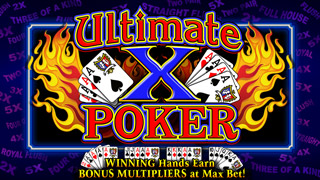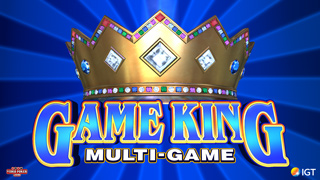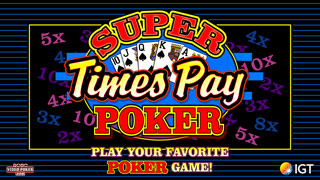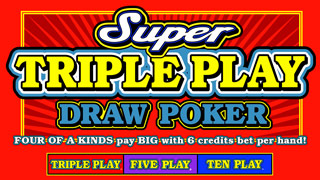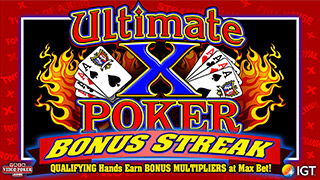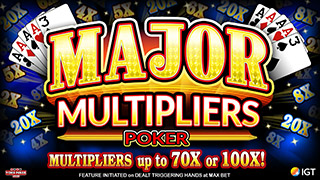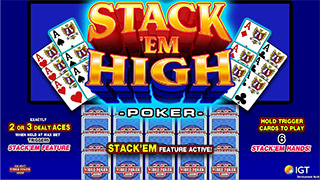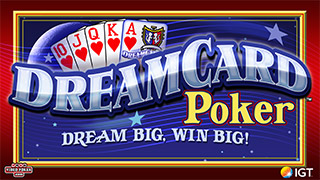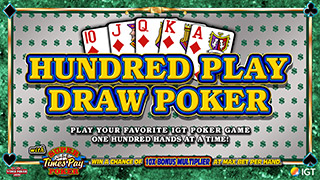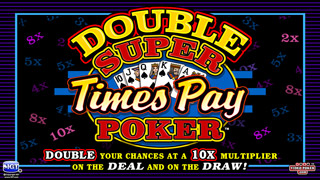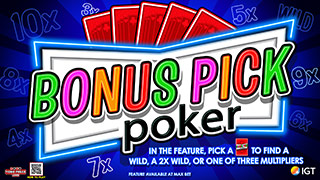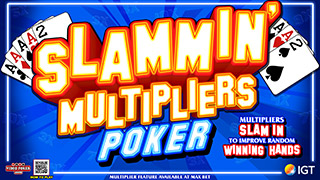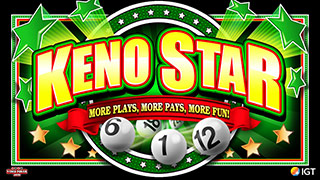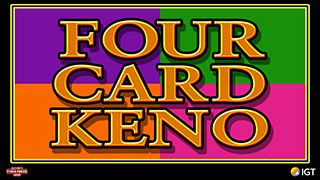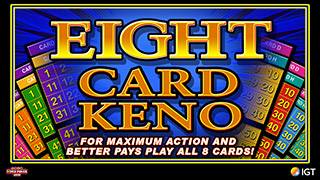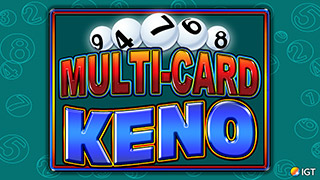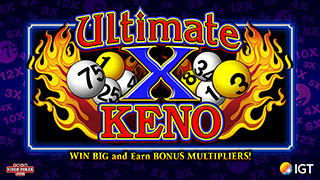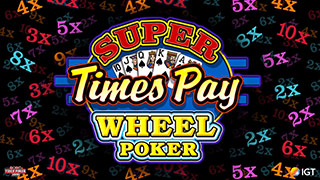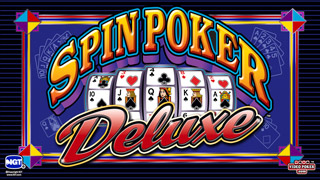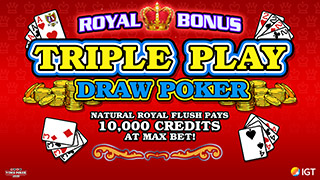10 Play triple double;
-
shadowman
- Video Poker Master
- Posts: 3587
- Joined: Mon Oct 23, 2006 5:42 pm
Re: 10 Play triple double;
I think a few things need to be explained. First of all, the expected return of any game is exactly the same whether it is multi-play or single play. The only thing that changes is the variance.
Second, there is no difference in the frequency of any particular result simply because of the pay table. When you see frequency numbers they are based on playing optimal strategy. However, if you play the exact same strategy for 9/5 vs. 9/7 you will see exactly the same frequencies. Think about it, it can't be different and still be random. Hence, you are always better off playing a better pay table.
So, to re-iterate. The statement "this game is 6/9, lessening chances for the 4 Ace hits" is not true. You will have the same chances with any pay table if you make the same holds.
Second, there is no difference in the frequency of any particular result simply because of the pay table. When you see frequency numbers they are based on playing optimal strategy. However, if you play the exact same strategy for 9/5 vs. 9/7 you will see exactly the same frequencies. Think about it, it can't be different and still be random. Hence, you are always better off playing a better pay table.
So, to re-iterate. The statement "this game is 6/9, lessening chances for the 4 Ace hits" is not true. You will have the same chances with any pay table if you make the same holds.
-
BillyJoe
- Video Poker Master
- Posts: 3198
- Joined: Sat Aug 23, 2008 2:00 pm
Well, the TDB 9/5 yields a 97% EV (Expected Value) when played with a "Perfect Play" strategy. per the software. Playing several thousand hands (or several hundred on 10-way) with a $2500 bankroll, the software says that you will never go broke, but you will see a profit only one-third of the time. If you play differently than the strategy would indicate, you can expect different, probably poorer, results.
Once again, I am not saying that you need to change your play, but any TDB game is very volatile, so you would need to get more than your share of premium hands to overcome the inherent deficit.
Good luck...
Once again, I am not saying that you need to change your play, but any TDB game is very volatile, so you would need to get more than your share of premium hands to overcome the inherent deficit.
Good luck...
-
ginfre
- Forum Regular
- Posts: 74
- Joined: Sat Jun 30, 2012 11:55 am
To shadowman and billyjoe....lol......my wife is calling me and i'm about turkered out, lol....regression analysis would answer, based on what is asked of it, lots of these variables. There is a point/place where playing 6/9 or 7/9 comes to an equal point to 5/9, based upon what one asks the analysis to perform, etc. The variance associated with any standard deviation is particularly interesting. In the end, I wish I could convince you guys of the relevance of what I have to submit. 97%, or another percent, is a secondary consideration when playing is involved, when a large score comes into play, when other factors come into play. Perfect play should be minimized. It is a non-starter. Play until your inner knowledge tells you when to move. That, plus a regression, will rule the day. Respectfully submitted.
-
onemoretry
- Video Poker Master
- Posts: 3118
- Joined: Tue Mar 03, 2009 8:00 pm
. Play until your inner knowledge tells you when to move.
How does your "inner knowledge" know that the next hand will not result in a royal?
-
shadowman
- Video Poker Master
- Posts: 3587
- Joined: Mon Oct 23, 2006 5:42 pm
In the end, I wish I could convince you guys of the relevance of what I have to submit.
You don't have to convince me of anything. However, there are a few thousand mathematicians that would find your claims amusing.
97%, or another percent, is a secondary consideration when playing is involved, when a large score comes into play, when other factors come into play. Perfect play should be minimized. It is a non-starter.
It is the only starter for those of us who believe mathematics is a useful tool.
Play until your inner knowledge tells you when to move. That, plus a regression, will rule the day. Respectfully submitted.
Well, if you are psychic then you have an additional tool I don't posses. That is why I use math.
You don't have to convince me of anything. However, there are a few thousand mathematicians that would find your claims amusing.
97%, or another percent, is a secondary consideration when playing is involved, when a large score comes into play, when other factors come into play. Perfect play should be minimized. It is a non-starter.
It is the only starter for those of us who believe mathematics is a useful tool.
Play until your inner knowledge tells you when to move. That, plus a regression, will rule the day. Respectfully submitted.
Well, if you are psychic then you have an additional tool I don't posses. That is why I use math.
-
BillyJoe
- Video Poker Master
- Posts: 3198
- Joined: Sat Aug 23, 2008 2:00 pm
To shadow man and billyjoe....lol......my wife is calling me and i'm about tuckered out, lol....regression analysis would answer, based on what is asked of it, lots of these variables. There is a point/place where playing 6/9 or 7/9 comes to an equal point to 5/9, based upon what one asks the analysis to perform, etc. The variance associated with any standard deviation is particularly interesting. In the end, I wish I could convince you guys of the relevance of what I have to submit. 97%, or another percent, is a secondary consideration when playing is involved, when a large score comes into play, when other factors come into play. Perfect play should be minimized. It is a non-starter. Play until your inner knowledge tells you when to move. That, plus a regression, will rule the day. Respectfully submitted.
Well, gin, somewhere along the way, you lost me with your train of thought. I, like you, have an MBA, but I must have dosed off during that part of my schooling.
While a large hit, like Aces/kckr in TDB, will cure many ills, it does not change the overall mathematical return on a particular game, since its frequency is considered in the EV. Games NEVER perform according to a straight line average, since they are random. While good, old fashioned, good fortune helps in the short term, over time, the math rules.
I am always open to different points of view on playing VP, but so far, I still feel that stronger pay tables are better for any given game, if you can find them.
Well, gin, somewhere along the way, you lost me with your train of thought. I, like you, have an MBA, but I must have dosed off during that part of my schooling.
While a large hit, like Aces/kckr in TDB, will cure many ills, it does not change the overall mathematical return on a particular game, since its frequency is considered in the EV. Games NEVER perform according to a straight line average, since they are random. While good, old fashioned, good fortune helps in the short term, over time, the math rules.
I am always open to different points of view on playing VP, but so far, I still feel that stronger pay tables are better for any given game, if you can find them.
-
ginfre
- Forum Regular
- Posts: 74
- Joined: Sat Jun 30, 2012 11:55 am
Dosing off was never a good thing during my MBA days, 1974-75. I'm running certain tests, and would like to report on the results when completed.
-
shadowman
- Video Poker Master
- Posts: 3587
- Joined: Mon Oct 23, 2006 5:42 pm
Dosing off was never a good thing during my MBA days, 1974-75. I'm running certain tests, and would like to report on the results when completed.
Maybe I can save you some time. Video Poker is a completely "solved" game. Essentially, it is just like the game of tic-tac-toe. All possible situations can be evaluated. As such, there is no need for any regression analysis to understand the game. All possible draws for each unique dealt hand can be evaluated and the optimal hold determined.
The only caveat to this view is that some holds could have rather large variances. This normally leads to a few cases where less variance in one choice could be used to give up some long term return in favor of a more consistent return. Overall, this has only a slight affect on optimal play strategies.
It sounds like you are proposing an opposite approach where one would give up a little return to add more variance. The result of this kind of approach would reduce the expected return AND widen the bell curve of probable results (PDF). While this *could* lead to better results if one was lucky, it would also lead to worse results for those who were unlucky. Overall, it would decrease the average result.
It should be noted that simply playing higher variance games does the same thing without giving up anything in return (assuming similar ERs).
Maybe I can save you some time. Video Poker is a completely "solved" game. Essentially, it is just like the game of tic-tac-toe. All possible situations can be evaluated. As such, there is no need for any regression analysis to understand the game. All possible draws for each unique dealt hand can be evaluated and the optimal hold determined.
The only caveat to this view is that some holds could have rather large variances. This normally leads to a few cases where less variance in one choice could be used to give up some long term return in favor of a more consistent return. Overall, this has only a slight affect on optimal play strategies.
It sounds like you are proposing an opposite approach where one would give up a little return to add more variance. The result of this kind of approach would reduce the expected return AND widen the bell curve of probable results (PDF). While this *could* lead to better results if one was lucky, it would also lead to worse results for those who were unlucky. Overall, it would decrease the average result.
It should be noted that simply playing higher variance games does the same thing without giving up anything in return (assuming similar ERs).
-
BobDancer
- Video Poker Master
- Posts: 1119
- Joined: Wed Mar 04, 2009 2:07 am
[QUOTE=shadowman
Maybe I can save you some time. Video Poker is a completely "solved" game. Essentially, it is just like the game of tic-tac-toe. All possible situations can be evaluated. As such, there is no need for any regression analysis to understand the game. All possible draws for each unique dealt hand can be evaluated and the optimal hold determined.
[/QUOTE]
I agree --- unless you take the word "completely" too seriously. There are some games where you don't have the algorighm for certain bonuses (such as Wheel Poker, for example). Not knowing that algorithm, you need to estimate it and so in those cases the game is only "moderately completely solved." Or phrased differently, "completely solved" subject to the accuracy of your estimate. Even without considering that, a major part of the winning process is mailers and working the comp system. Often the size of your mailer will affect whether a particular game is playable. One can make certain assumptions, but your play is NOW and the mailers are coming some time in the future --- if at all. That example would affect your play-or-not strategy, but not how-do-you-play-the-hands. And example of the latter would be if you got some sort of scratcher for every quad. To work out correct strategy you'd need to get a good estimate of how much the scratcher is worth. With enough data one can get a reasonably good estimate, but if the "big" prize was a 1-in-10,000 event there's a good chance you wouldn't have a big enough sample size to estimate it correctly. Bob
-
ginfre
- Forum Regular
- Posts: 74
- Joined: Sat Jun 30, 2012 11:55 am
Thanks for all the contributions. Here are the results of my two tests. I plan a third, during this week, the variables are not completely determined. I wanted to prove things for myself, but thank you for all the positive inputs. Both tests are not complete in sample size, for a solid conclusion, but, for me, sufficiently conclusive: On holding two pair, playing triple double 10 Play, at all times (except with aces), that is to say, if 2's, 3's or 4's appear, holding just this pair: The samples were slow in coming, but alternating 20 opportunities, the following result: 700 credits won, or 70 per hand, holding two pair, when one of the pair, again, was 2's, 3's, or 4's. 275 credits won, or 27.5 per hand, when keeing just the 2's, 3's, or 4's My conclusion: Keeping both pair nearly always, unless......your bankroll needs a boost and your willing to take the chance. Again, only 20 samples, but the trending tells me that, yes, eventually there would be a 4 of a kind hit, but the disparity in the numbers, so far, makes me wonder if it'd be worth it. I say take the two pair, be happy with any full house, and move on. The second test: Holding an ace and another one paying card, compared to holding an ace only, when no other opportunities were presented: Again, alternating 100 total deals, it was a near dead heat: 50 with the ace and another paying card resulted in 1185 credits, and 50 with the ace only resulted in 1090 credits. It was nip and tuck to the end, on the 46th try a few flushes put the ace and another paying card over the top. There were no four of a kinds. For me, I see holding the ace and another paying card of the same suit, but, if not, its only the ace for me. Again, this was a triple double 10 play experiment. I like to go for a royal with three present, so long as one of these cards is the ace. Of course, three of a kind is not presented at the same time. I feel there are circumstances when, if the three of a kind was ten-king, going for the royal makes sense. I've learned a number of nuances from this exercise, I like playing the devil's advocate, the 'what if' guy in group efforts. Seems to bring out the best for all concerned. Thanks again.



